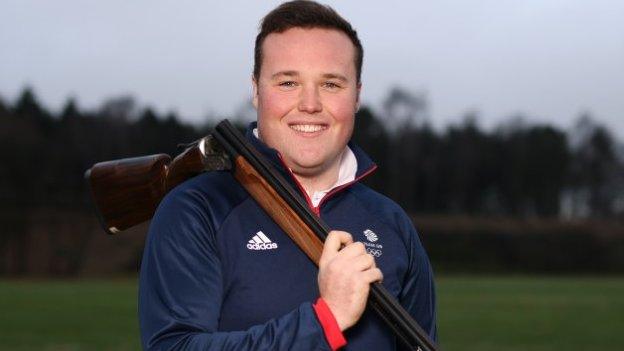Tokyo Olympics: How Matthew Coward-Holley went from broken back to shooting success
- Published

Coward-Holley was a promising rugby player before injury ended his career
If asked to name Team GB's most likely Tokyo Olympic gold medallists, who would you list? Sprint star Dina Asher-Smith? The near-unbeatable swimming sensation Adam Peaty? Or perhaps history-seeking taekwondo champion Jade Jones?
You would be correct with any of the above - and there are also many more - but there is at least one contender few outside the sport of shooting will have heard of: Matthew Coward-Holley.
He is a reigning world and European champion and heads to Japan as a favourite for gold in the men's Olympic trap discipline.
Were it not for two "scary" near life-changing injuries though, the 26-year-old might have been targeting a place in the British Lions squad this summer rather than donning the Team GB kit he now wears with such pride.
"When I was younger a career in rugby is what I wanted and I used to dream of playing for England," he told BBC Sport.
"To have a second chance at a sporting career and to now be in Tokyo for the Olympics means everything to me."
Coward-Holley was a promising and passionate prop in his early teens and trialled for Essex, but that dedication and determination in part led to his initial injury.
"I was doing some training drills and someone moved a little bit out of the way, but I was fully committed to the tackle pad and when it wasn't there I landed a bit funny," he says.
"I had limited feeling in my legs - I could still move them but the sensation was odd. I knew something wasn't quite right and that was pretty scary," he said.
In hospital he was diagnosed with two cracked vertebrae and a cracked disc, but was expected to make a full recovery.
After 18 months of rehabilitation - and playing in a host of "wacky" positions for a player of his size, such as on the wing, full-back and fly-half - he proved he was ready for a return to regular action.
"It was great to be back on the pitch, doing what I loved, but then towards the end of the season there was a bad tackle," Coward-Holley recalled.
"Someone fell across my legs as I went to put the ball behind me and someone else went into my back and basically twisted me in half.
"This time it was three cracked vertebrae and three slipped discs and I was very young to be having those sorts of injuries.
"I was told 'that's the end of your rugby career' very clearly."
Unlike after his initial accident, medical experts insisted the severity of Coward-Holley's second was too great for him to contemplate a return, as a third could result in paralysis.
"Being told at 14 or 15 'no you're not playing rugby any more' was devastating and I was pretty low for about a year, not knowing what to do."
The "urge to get competitive" then returned and his thoughts turned to shooting, a sport he had "done for fun" with his father between the ages of eight and 12 before focusing on rugby.
Under the guidance of Bill Theobald at his local club in Chelmsford, Coward-Holley began making rapid progress and inspired by Peter Wilson's double trap Olympic gold success at London 2012, he was soon targeting the event himself.
"I discovered I had a bit of natural talent for it and won a lot of things domestically before making the England team, and I was the reserve for Team GB in Rio," he said.
Six months later though the sport's international federation (ISSF) revealed the discipline would not be included in the Tokyo 2020 Games line-up.
Undeterred, he transitioned to the single trap event and finished an impressive fifth at the European Championships that year, before securing his first individual world title in 2019.
The shooter then followed up Team GB selection by securing a maiden European gold last month and heads to Tokyo as one of the rising stars of the sport.
"Of course there is now a degree of expectation, but I'm out there to do my job and forge my own path without thinking about that," he states.
"The Olympics is special no matter what form the Games will take [because of Coronavirus restrictions] and I'm going to make it the best experience possible."

The tough questions facing Uefa: The Sports Desk team look at the problematic side of Euro 2020
Will colonising Mars save the Earth?: Why Elon Musk believes it's our only hope
